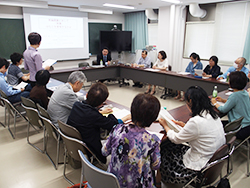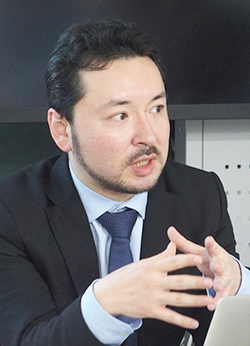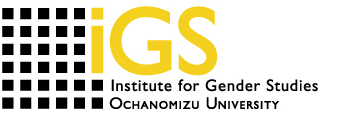IGS seminar: What Do People Mean When They Talk About Constitutional Revision?
For their second seminar on constitutional amendment, the Conference on Gender and Politics in East Asia invited Kenneth Mori McElwain, Associate Professor at the University of Tokyo Institute of Social Science and public opinion polling expert, to attend. The seminar was held on June 14th, 2017, with the following theme—“What Do People Mean When They Talk About Constitutional Revision?”
Japan’s is the world’s oldest unamended constitution, but amendment discussions have heated up in recent years, with the media also presenting assertions from various political parties. However, Mr. McElwain pointed out that, by contrast, public opinion on constitutional amendment has not been sufficiently verified.
In June 2017, using an independent online opinion poll experiment, Mr. McElwain examined the extent to which public opinion is influenced by who they perceive to be proposing the constitutional amendment proposals.
The experiment divided the subjects of the opinion poll into two groups. One group was presented with the Liberal Democratic Party’s (hereinafter LDP) 2012 amendment proposals as “the LDP amendment proposals,” whereas the other group was presented with the same 2012 LDP proposal as “the experts’ proposals.” The poll subjects were then asked for their opinions on each of the proposed amendments. The two groups’ responses were then compared against each other.
The results of the comparison revealed that those who had been told they were looking at an “experts’ proposals” were about 5%–10% more likely to agree with the amendment proposals. A difference was also observed on an issue-by-issue basis. Notably, for new issues that had not been included in amendment discussions up to that point, environmental rights and privacy rights, the results showed that respondents were more likely to agree with the “experts’ amendment proposals.” In contrast, with respect to traditional issues such as Constitution Article 9 and the Imperial Family, no statistically significant difference was observed between the responses of the two groups. Mr. McElwain interpreted this as respondents already identifying these issues as conservative, irrespective of who was proposing them.
In this experiment, no consistent gender difference was observed. However, a tendency for women to prefer the “experts’ amendment proposals” with respect to privacy rights and national emergency articles was observed; and a tendency for men to prefer the “experts’ amendment proposals” with respect to the right to know and environmental rights was observed.
The seminar participants engaged in lively discussion on gender differences in the responses and the extent to which the media’s role in framing public opinion polls questions about constitutional amendment impacted those differences.



